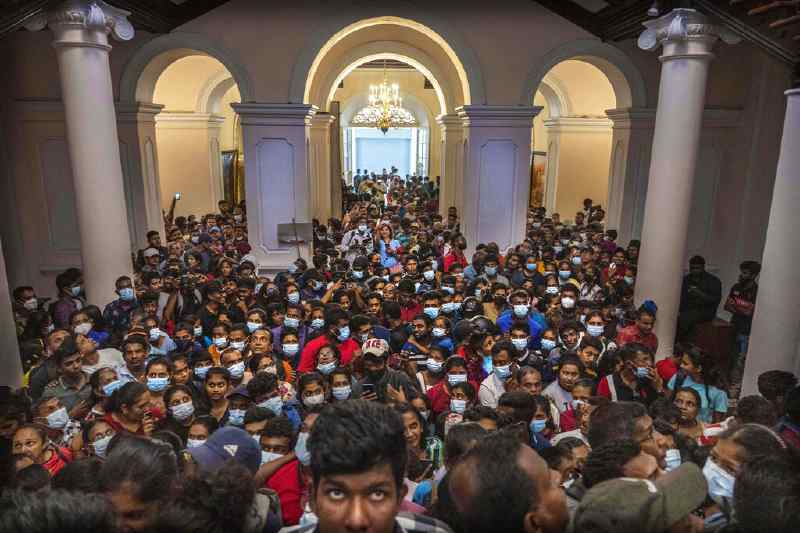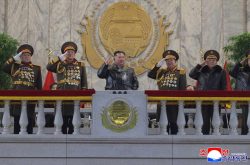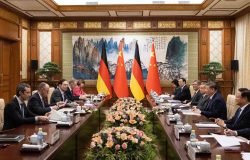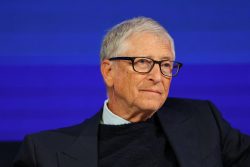
People throng President Gotabaya Rajapaksa’s official residence for the second day after it was stormed in Colombo, Sri Lanka, Monday, July 11, 2022. Political turmoil hit debt-laden Sri Lanka, where protesters broke into President Rajapaska’s residence and forced him into resigning after fleeing abroad.
17:16 JST, December 15, 2022
Natural disasters and crowd-related tragedies claimed hundreds of lives in Asia and overshadowed the COVID-19 pandemic, with most countries easing or completely lifting the tough restrictions of the previous two years. Even China, the last major country to try to control virus transmission through a “zero-COVID” strategy, relaxed the rigorous rules that triggered rare public protests.
Political turmoil hit debt-laden Sri Lanka, where protesters broke into President Gotabaya Rajapaksa’s residence and forced him into resigning after fleeing abroad. He later returned to the country headed by a new leader, Ranil Wickremesinghe, who negotiated a bailout package with international lenders contingent on sweeping economic reforms.
Japan was shocked by the assassination of former Prime Minister Shinzo Abe during a campaign rally on July 8. The suspect cited Abe’s links to the ultra-conservative Unification Church, whose ties to the ruling party caused major headaches for the new prime minister, Fumio Kishida.
In Seoul, 156 young revelers were crushed to death when more than 100,000 people flocked to the city’s popular nightlife district for Halloween celebrations, the first since the country’s strict COVID-19 restrictions were lifted.
Earlier in October, police at a soccer match in Indonesia fired tear gas after some fans spilled onto the field, sending people rushing toward the exits, some of which were locked, and causing a crush that left 135 dead.
Still that same month, the collapse of a newly repaired suspension bridge in India’s Gujarat state killed 134 people as hundreds were celebrating the Hindu festival season.
In November, a shallow 5.6 magnitude earthquake struck Indonesia’s main Java island, killing 334 people and injuring nearly 600.
And in Thailand, the deadliest mass killing in the country left 36 dead when a fired police officer stormed a rural day care center and massacred mostly preschoolers.
China entered the year as host of the Beijing Winter Olympics in February, with participants and guests sequestered in a “bubble” as part of strict COVID-19 rules.
But the country’s pandemic approach — which seeks to isolate every single infection at a huge cost to the economy and freedom of movement — unraveled when thousands took to the streets in major cities to protest the restrictions and call for leader Xi Jinping and the Communist Party to step down. The party responded with a massive show of force and an unknown number of people were arrested.
The government under Xi, who granted himself new powers as China’s potential leader for life, relaxed measures and indicated it will tolerate more cases without quarantines or shutting down travel or businesses as it winds down its “zero-COVID” strategy, even as cases rise and threaten to overwhelm health resources.
Top Articles in News Services
-

Survey Shows False Election Info Perceived as True
-

Hong Kong Ex-Publisher Jimmy Lai’s Sentence Raises International Outcry as China Defends It
-

Japan’s Nikkei Stock Average Touches 58,000 as Yen, Jgbs Rally on Election Fallout (UPDATE 1)
-

Japan’s Nikkei Stock Average Falls as US-Iran Tensions Unsettle Investors (UPDATE 1)
-

Trump Names Former Federal Reserve Governor Warsh as the Next Fed Chair, Replacing Powell
JN ACCESS RANKING
-

Producer Behind Pop Group XG Arrested for Cocaine Possession
-

Japan PM Takaichi’s Cabinet Resigns en Masse
-

Man Infected with Measles Reportedly Dined at Restaurant in Tokyo Station
-

Israeli Ambassador to Japan Speaks about Japan’s Role in the Reconstruction of Gaza
-

Videos Plagiarized, Reposted with False Subtitles Claiming ‘Ryukyu Belongs to China’; Anti-China False Information Also Posted in Japan
























